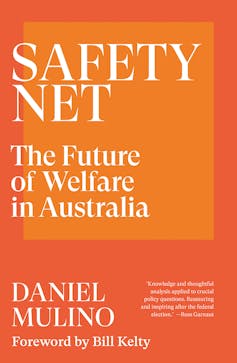Income redistribution or social insurance? A federal MP considers the future of the welfare state
- Written by John Quiggin, Professor, School of Economics, The University of Queensland

The Albanese government has something of an embarrassment of intellectual riches, with no less than three of its MPs holding PhDs in economics. Two of them, Andrew Charlton and Andrew Leigh, are also prolific authors with at least a dozen books between them.
Now Daniel Mulino, who holds the Victorian seat of Fraser as well as a PhD from Yale, has entered the lists with Safety Net: The Future of Welfare in Australia[1].
Review: Safety Net: The Future of Welfare in Australia – Daniel Mulino (Black Inc).
Mulino offers a lot more than discussion of Australian welfare policy. His book also includes a detailed history of the welfare state and an analysis of the theory of risk management underlying social insurance. Some readers may find these sections heavy going, but they will be a valuable resource for others.

















